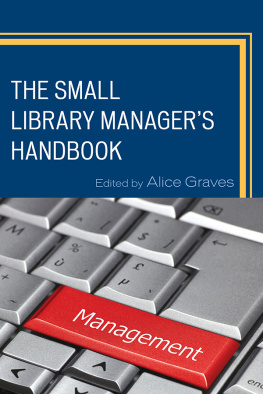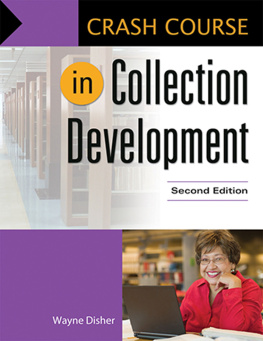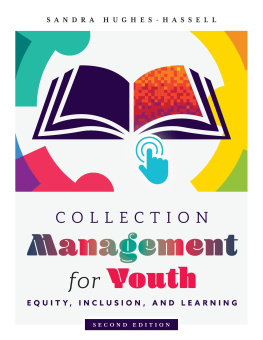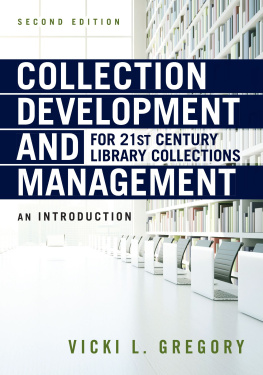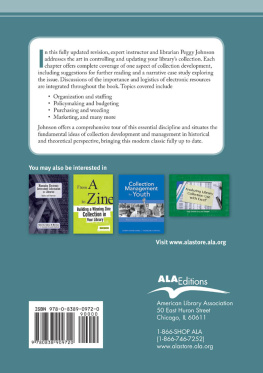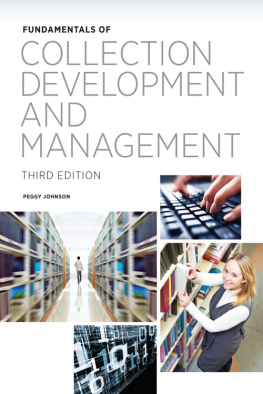RETHINKING COLLECTION DEVELOPMENT AND MANAGEMENT
Becky Albitz
Christine Avery
Diane Zabel

Copyright 2014 by Becky Albitz, Christine Avery, and Diane Zabel
All rights reserved. No part of this publication may be reproduced, stored in a retrieval system, or transmitted, in any form or by any means, electronic, mechanical, photocopying, recording, or otherwise, except for the inclusion of brief quotations in a review, without prior permission in writing from the publisher.
Library of Congress Cataloging-in-Publication Data
Rethinking collection development and management / Becky Albitz, Christine Avery, and Diane Zabel, editors.
pages cm
Includes bibliographical references and index.
ISBN 978-1-61069-305-9 (pbk. : acid-free paper)
ISBN 978-1-61069-306-6 (ebook) 1. Collection management (Libraries) 2. Collection development (Libraries) 3. Acquisitions (Libraries) 4. Library materialsConservation and restoration. I. Albitz, Becky, editor of compilation. II. Avery, Christine, 1954 editor of compilation. III. Zabel, Diane, editor of compilation.
Z687.R48 2014
025.21dc23 2013038447
ISBN: 978-1-61069-305-9
EISBN: 978-1-61069-306-6
18 17 16 15 14 1 2 3 4 5
This book is also available on the World Wide Web as an eBook.
Visit www.abc-clio.com for details.
Libraries Unlimited
An Imprint of ABC-CLIO, LLC
ABC-CLIO, LLC
130 Cremona Drive, P.O. Box 1911
Santa Barbara, California 93116-1911
This book is printed on acid-free paper 
Manufactured in the United States of America
CONTENTS
Robert W. Boissy
Mark Sandler
Laurel Tarulli
Nadine P. Ellero and Juliet T. Rumble
David A. Tyckoson
Merle Jacob, Sue OBrien, and Bonnie Reid
John M. Budd
Robert Alan
Sian Brannon
Neal Wyatt
Jeffrey D. Carroll
Kathy Tezla and Victoria Morse
Anne Behler
Kathleen Sullivan
James LaRue
Michael Levine-Clark
Christopher Baker
deg farrelly
Linda R. Musser and Christopher H. Walker
Logan Macdonald
Jody Condit Fagan and Meris A. Mandernach
Kim Armstrong
Karen E. Greever
Wendy Bartlett
Robert H. Kieft
Steven K. Galbraith
Thomas F. R. Clareson
L. Suzanne Kellerman
Jacob Nadal
ACKNOWLEDGMENTS
The old saying if you want something done, ask a busy person to do it comes to mind as we take this opportunity to thank our many contributors. Our authors are all highly accomplished in their various fields and as a result are very busy indeed. We are all the more grateful for the care and thought that went into these chapters as we know the time spent by each individual was precious, but given generously.
In addition, we would like to extend a special thank you to John Swinton, who kindly agreed on short notice to index this volume. Becky, in particular, says, thanks, Dad!
INTRODUCTION
Collection development and management have changed dramatically during the past 25 years. The fact that management has become the predominant word in this activity illustrates a shift in focus from the physical selection, acquisition, and preservation of the object to providing access to a variety of content, no matter who owns the materials or what the packaging is. This shift becomes more evident when the table of contents to Evans second edition of Developing Library and Information Center Collections, published in 1987, is compared to this volumes chapter titles. On the surface they appear similarboth address topics such as selection, weeding, cooperative collection development, and preservationfoundation activities of collection building and maintenance. Rethinking Collection Development and Management, however, redefines collection-related activities for the 21st centuryexpanding the definitions of each of these activities to take into account the critical issues facing the profession. These include technological innovations, licensing rather than purchase of content, funding restrictions, physical space limitations, and a pervasive culture of assessment. All of these pressures create a climate that encourages cooperation and creativity, both of which are evident in our contributors approaches to a variety of collections challenges. Our goal is not to supersede the classic collection development texts, as they continue to provide valuable context to future library and information science professionals. Rather, our hope is to examine these same issues in light of our current environment so that these same professionals have both a theoretical and practical foundation upon which to build their collections skills.
A unique feature of this book is its first chapter. In addition to the factors discussed previously, one that is often mentioned is the publishing environment. Publishing and the mission and goals of publishers are often portrayed as inherently in conflict with the values of the library profession. Publishers, however, are a critical part of the information ecosystem, and an understanding of the pressures they face in order to remain viable will assist the library professional in working effectively with his or her publisher counterparts. Robert W. Boissy provides such an overview and establishes an excellent foundation upon with to build our discussion about collections.
The next six chapters broadly examine the role of the subject librarian in selection and assessment of library materials. John M. Budd provides an overview of the current collection-related topics and trends in the library and information science curriculum. In a provocative chapter that examines the past, current, and future role of collection development in the large research library, Mark Sandler considers the value, broadly speaking, of local collection building and the future role of the subject specialist. In the public library setting, collections librarians must work closely with librarians and staff in other units in order to provide optimum service to their communities. Laurel Tarulli examines the dynamics between and among public and technical services staff, and how this relates to collections. Although it is easy to forget about library materials once licensed or purchased, a collections librarian is continuously evaluating collections and assessing their ongoing value. Nadine P. Ellero and Juliet T. Rumble discuss strategies in evaluating subscription databasesa critical activity considering the money devoted to these resources and the ever-changing availability of alternative ways to expose library content to our users. Finally, as mentioned earlier, physical space is an issue for the vast majority of libraries, as well as the need to keep collections accurate and relevant. Two chapters on collection weeding, one from an academic library perspective (David A. Tyckoson) and the other from the public library view (Merle Jacob, Sue OBrien, and Bonnie Reid), discuss a collection management activity that addresses both currency and overcrowding.
How we locate and acquire materials has changed as well. While book and material reviews are still common selection tools, Neal Wyatt explores other resources that offer guidance to collections librarians. In other cases explored here, librarians have partially ceded content selection to other constituents. Kathy Tezla and Victoria Morse first relate the history of collection development at Carleton College, where the teaching faculty play a central role in title selection and collection building, and then discuss, from the faculty perspective, the practical implications of this collection development model. In Robert Alans chapter on demand-driven acquisitions, the development of an eBook collection at Penn State University based on the actual use of a title prior to purchase places the onus of developing that collection on the user. One way to acquire popular materials or materials with a limited shelf life is through leasing rather than purchase. This method allows the library to make multiple copies of a high-demand title available while not investing the collections budget in purchasing, cataloging, housing, and preserving them. Anne Behler writes about developing a leased popular content collection for an academic library while Kathleen Sullivan discusses the value of such a collection for public libraries. Finally, Sian Brannon examines the pros and cons of four acquisition models used in public libraries: centralized, decentralized, outsourcing, and hybrid.


